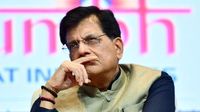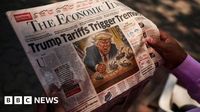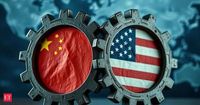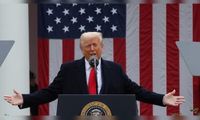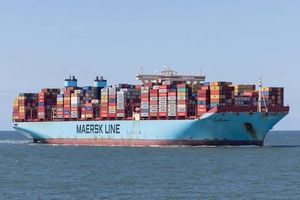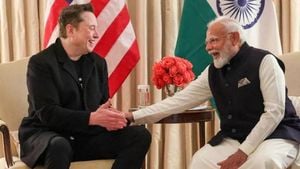As the world grapples with the implications of aggressive trade policies, India's position in the global market is becoming increasingly complex. The recent actions of U.S. President Donald Trump, including a significant increase in tariffs on Chinese imports and a temporary pause on reciprocal tariffs for many countries, have raised questions about the future of international trade dynamics. According to Swaminathan Aiyar, a prominent economist, the potential slowdown in the economies of the United States and China could have dire consequences for India, far exceeding the impact of bilateral tariffs.
On April 11, 2025, Aiyar noted that the U.S. has escalated duties on Chinese imports to a staggering 145%. This move comes in the wake of Trump's decision to pause planned tariffs on goods from various countries, including India, for 90 days. Aiyar remarked that the tariffs announced on April 2 should have been termed "Recession Day" instead of "Liberation Day," highlighting concerns that these measures could disrupt supply chains and hinder economic growth globally.
The uncertainty surrounding Trump's trade policies has left economists and investors in a state of confusion. Goldman Sachs recently revised its forecast for a U.S. recession, predicting a sharp slowdown in the American economy this year, while JPMorgan Chase maintained a 60% chance of recession. In response to these developments, the Reserve Bank of India (RBI) has lowered its economic growth forecast for the current financial year and reduced the repo rate by 25 basis points to 6%. Moody’s Analytics has similarly adjusted its outlook for India, expecting growth of just 6.1% in 2025, down from previous estimates.
Aiyar expressed that while a full-scale financial meltdown appears to have been averted, the likelihood of a U.S. recession is increasing. He predicted that China, too, would face a significant slowdown due to the tariffs, which could have a ripple effect on the global economy. He emphasized that the uncertainty surrounding Trump's next moves has become a critical factor in the global economic landscape, impacting investor behavior and market stability.
Despite the pause in tariffs, Aiyar warned that a trade war has already begun, with high tariffs imposed on numerous goods. He stated, "If you have these high 25% on so many items, 10% on so many items, 145% on China, please let us be clear, a trade war has begun." The ramifications of this trade conflict are expected to be severe, with Aiyar noting that the extent and duration of the impact on global GDP remain uncertain.
While there are discussions about whether India could benefit from manufacturers diversifying away from China, Aiyar offered a tempered perspective. He stated, "Some crumbs may fall into our table," suggesting that while India might gain in certain sectors like textiles, the overall impact of a global slowdown would outweigh these benefits. He pointed out that India's key exports, including steel, aluminum, and pharmaceuticals, remain vulnerable to the high tariffs imposed by the U.S.
Moreover, Aiyar highlighted the challenges posed by the bond market's reaction to Trump's policies, which forced the president to reconsider his aggressive tariff strategies. He compared the situation to the fiscal chaos experienced in the UK under former Prime Minister Liz Truss, warning that the bond market's stability is crucial for avoiding a financial crisis.
Looking ahead, Aiyar believes that the trade war will remain a significant risk for the global economy in the coming years. He quoted Winston Churchill, stating, "This is not the end, it is not even the beginning of the end, it is just the end of the beginning," indicating that further tariff actions are likely as Trump seeks to fulfill his promises to bring manufacturing back to the U.S.
In a related context, India's Commerce and Industry Minister Piyush Goyal confirmed on the same day that the country is in continuous dialogue with the U.S. regarding a proposed bilateral trade agreement (BTA). The goal is to finalize the first phase of the agreement by fall 2025, aiming to more than double bilateral trade to $500 billion by 2030 from the current $191 billion. Goyal emphasized the importance of safeguarding national interests and ensuring that negotiations are not rushed.
India's historical context reveals a complex relationship with trade policies. The country has a legacy of protectionism that has hindered its competitiveness in the global market. Despite being the world's fifth-largest and fastest-growing major economy, India's share of global exports remains under 2%. Rajeswari Sengupta, an economist, noted that if export-driven economies struggle under tariff pressure while India maintains a 6% growth rate, the country could emerge stronger in comparison.
However, the path to leveraging this potential is fraught with challenges. India's long-standing protectionist policies have often stifled innovation and competitiveness, particularly in labor-intensive sectors like textiles. As the global landscape shifts, there is a pressing need for India to gradually open up to trade and enhance its export capabilities.
As India navigates this uncertain terrain, the government must also consider the implications of Trump's tariffs on its economy. If the U.S. follows through on its plans, India could face a $7.76 billion, or 6.4%, drop in exports to the U.S. this year, according to estimates from the Global Trade Research Initiative (GTRI). The stakes are high, as India's exports to the American market totaled $89 billion in 2024.
To mitigate the impact of these tariffs, experts suggest that India should pursue broader trade agreements with the European Union, the UK, and Canada while also deepening ties with key partners such as China, Russia, and Japan. Domestically, reforms are essential to simplify tariffs, streamline the goods and services tax (GST), and improve trade processes.
As the world watches the unfolding trade dynamics, India's ability to adapt and seize opportunities will be critical in determining its economic trajectory amid global uncertainty.
